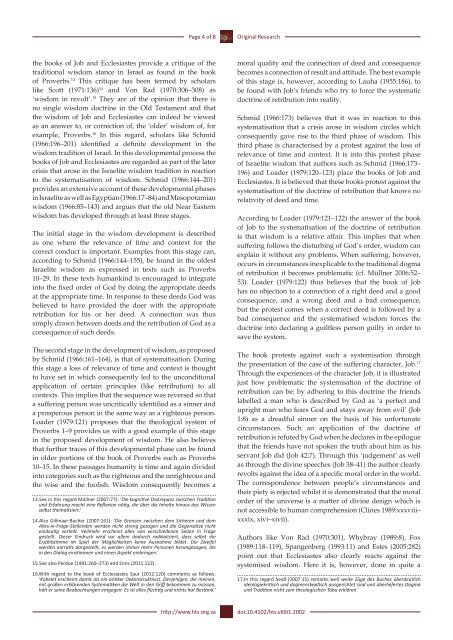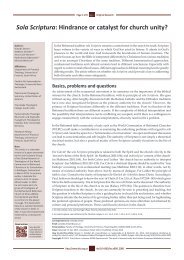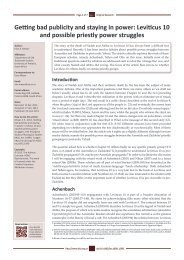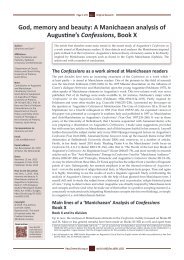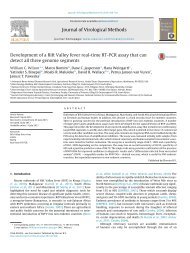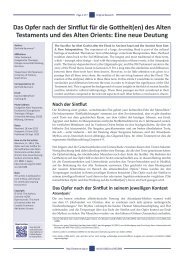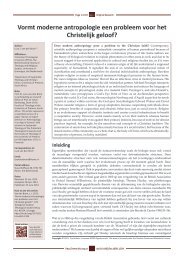Job and Ecclesiastes as (postmodern?) - HTS Teologiese Studies ...
Job and Ecclesiastes as (postmodern?) - HTS Teologiese Studies ...
Job and Ecclesiastes as (postmodern?) - HTS Teologiese Studies ...
Create successful ePaper yourself
Turn your PDF publications into a flip-book with our unique Google optimized e-Paper software.
Page 4 of 8<br />
Original Research<br />
the books of <strong>Job</strong> <strong>and</strong> <strong>Ecclesi<strong>as</strong>tes</strong> provide a critique of the<br />
traditional wisdom stance in Israel <strong>as</strong> found in the book<br />
of Proverbs. 13 This critique h<strong>as</strong> been termed by scholars<br />
like Scott (1971:136) 14 <strong>and</strong> Von Rad (1970:306–308) <strong>as</strong><br />
‘wisdom in revolt’. 15 They are of the opinion that there is<br />
no single wisdom doctrine in the Old Testament <strong>and</strong> that<br />
the wisdom of <strong>Job</strong> <strong>and</strong> <strong>Ecclesi<strong>as</strong>tes</strong> can indeed be viewed<br />
<strong>as</strong> an answer to, or correction of, the ‘older’ wisdom of, for<br />
example, Proverbs. 16 In this regard, scholars like Schmid<br />
(1966:196–201) identified a definite development in the<br />
wisdom tradition of Israel. In this developmental process the<br />
books of <strong>Job</strong> <strong>and</strong> <strong>Ecclesi<strong>as</strong>tes</strong> are regarded <strong>as</strong> part of the later<br />
crisis that arose in the Israelite wisdom tradition in reaction<br />
to the systematisation of wisdom. Schmid (1966:144–201)<br />
provides an extensive account of these developmental ph<strong>as</strong>es<br />
in Israelite <strong>as</strong> well <strong>as</strong> Egyptian (1966:17–84) <strong>and</strong> Mesopotamian<br />
wisdom (1966:85–143) <strong>and</strong> argues that the old Near E<strong>as</strong>tern<br />
wisdom h<strong>as</strong> developed through at le<strong>as</strong>t three stages.<br />
The initial stage in the wisdom development is described<br />
<strong>as</strong> one where the relevance of time <strong>and</strong> context for the<br />
correct conduct is important. Examples from this stage can,<br />
according to Schmid (1966:144–155), be found in the oldest<br />
Israelite wisdom <strong>as</strong> expressed in texts such <strong>as</strong> Proverbs<br />
10–29. In these texts humankind is encouraged to integrate<br />
into the fixed order of God by doing the appropriate deeds<br />
at the appropriate time. In response to these deeds God w<strong>as</strong><br />
believed to have provided the doer with the appropriate<br />
retribution for his or her deed. A connection w<strong>as</strong> thus<br />
simply drawn between deeds <strong>and</strong> the retribution of God <strong>as</strong> a<br />
consequence of such deeds.<br />
The second stage in the development of wisdom, <strong>as</strong> proposed<br />
by Schmid (1966:161–164), is that of systematisation. During<br />
this stage a loss of relevance of time <strong>and</strong> context is thought<br />
to have set in which consequently led to the unconditional<br />
application of certain principles (like retribution) to all<br />
contexts. This implies that the sequence w<strong>as</strong> reversed so that<br />
a suffering person w<strong>as</strong> uncritically identified <strong>as</strong> a sinner <strong>and</strong><br />
a prosperous person in the same way <strong>as</strong> a righteous person.<br />
Loader (1979:121) proposes that the theological system of<br />
Proverbs 1–9 provides us with a good example of this stage<br />
in the proposed development of wisdom. He also believes<br />
that further traces of this developmental ph<strong>as</strong>e can be found<br />
in older portions of the book of Proverbs such <strong>as</strong> Proverbs<br />
10–15. In these p<strong>as</strong>sages humanity is time <strong>and</strong> again divided<br />
into categories such <strong>as</strong> the righteous <strong>and</strong> the unrighteous <strong>and</strong><br />
the wise <strong>and</strong> the foolish. Wisdom consequently becomes a<br />
13.See in this regard Müllner (2007:77): ‘Die kognitive Diskrepanz zwischen Tradition<br />
und Erfahrung macht eine Reflexion nötig, die über die Inhalte hinaus d<strong>as</strong> Wissen<br />
selbst thematisiert.’<br />
14.Also Gillmayr-Bucher (2007:161): ‘Die Grenzen zwischen dem Sicheren und dem<br />
Alles-in-Frage-Stellenden werden nicht streng gezogen und die Gegensätze nicht<br />
eindeutig verteilt. Veilmehr erscheint alles von verschiedenen Seiten in Frage<br />
gestellt. Dieser Eindruck wird vor allem dadurch radikalisiert, d<strong>as</strong>s selbst die<br />
Erzählstimme im Spiel der Möglichkeiten keine Ausnahme bildet. Die Zweifel<br />
werden narrativ dargestellt, es werden immer mehr Personen herangezogen, die<br />
in den Dialog einstimmen und einen Aspekt einbringen.’<br />
15.See also Perdue (1991:260–273) <strong>and</strong> Enns (2011:122).<br />
16.With regard to the book of <strong>Ecclesi<strong>as</strong>tes</strong> Saur (2012:120) comments <strong>as</strong> follows:<br />
‘Kohelet erscheint damit als ein antiker Dekonstruktivist. Denjenigen, die meinen,<br />
mit groβen erklärenden Systematiken die Welt in den Griff bekommen zu müssen,<br />
hält er seine Beobachtungen entgegen: Es ist alles flüchtig und nichts hat Best<strong>and</strong>.’<br />
moral quality <strong>and</strong> the connection of deed <strong>and</strong> consequence<br />
becomes a connection of result <strong>and</strong> attitude. The best example<br />
of this stage is, however, according to Lauha (1955:186), to<br />
be found with <strong>Job</strong>’s friends who try to force the systematic<br />
doctrine of retribution into reality.<br />
Schmid (1966:173) believes that it w<strong>as</strong> in reaction to this<br />
systematisation that a crisis arose in wisdom circles which<br />
consequently gave rise to the third ph<strong>as</strong>e of wisdom. This<br />
third ph<strong>as</strong>e is characterised by a protest against the loss of<br />
relevance of time <strong>and</strong> context. It is into this protest ph<strong>as</strong>e<br />
of Israelite wisdom that authors such <strong>as</strong> Schmid (1966:173–<br />
196) <strong>and</strong> Loader (1979:120–123) place the books of <strong>Job</strong> <strong>and</strong><br />
<strong>Ecclesi<strong>as</strong>tes</strong>. It is believed that these books protest against the<br />
systematisation of the doctrine of retribution that knows no<br />
relativity of deed <strong>and</strong> time.<br />
According to Loader (1979:121–122) the answer of the book<br />
of <strong>Job</strong> to the systematisation of the doctrine of retribution<br />
is that wisdom is a relative affair. This implies that when<br />
suffering follows the disturbing of God’s order, wisdom can<br />
explain it without any problems. When suffering, however,<br />
occurs in circumstances inexplicable to the traditional dogma<br />
of retribution it becomes problematic (cf. Müllner 2006:52–<br />
53). Loader (1979:122) thus believes that the book of <strong>Job</strong><br />
h<strong>as</strong> no objection to a connection of a right deed <strong>and</strong> a good<br />
consequence, <strong>and</strong> a wrong deed <strong>and</strong> a bad consequence,<br />
but the protest comes when a correct deed is followed by a<br />
bad consequence <strong>and</strong> the systematised wisdom forces the<br />
doctrine into declaring a guiltless person guilty in order to<br />
save the system.<br />
The book protests against such a systemisation through<br />
the presentation of the c<strong>as</strong>e of the suffering character, <strong>Job</strong>. 17<br />
Through the experiences of the character <strong>Job</strong>, it is illustrated<br />
just how problematic the systemisation of the doctrine of<br />
retribution can be: by adhering to this doctrine the friends<br />
labelled a man who is described by God <strong>as</strong> ‘a perfect <strong>and</strong><br />
upright man who fears God <strong>and</strong> stays away from evil’ (<strong>Job</strong><br />
1:8) <strong>as</strong> a dreadful sinner on the b<strong>as</strong>is of his unfortunate<br />
circumstances. Such an application of the doctrine of<br />
retribution is refuted by God when he declares in the epilogue<br />
that the friends have not spoken the truth about him <strong>as</strong> his<br />
servant <strong>Job</strong> did (<strong>Job</strong> 42:7). Through this ‘judgement’ <strong>as</strong> well<br />
<strong>as</strong> through the divine speeches (<strong>Job</strong> 38–41) the author clearly<br />
revolts against the idea of a specific moral order in the world.<br />
The correspondence between people’s circumstances <strong>and</strong><br />
their piety is rejected whilst it is demonstrated that the moral<br />
order of the universe is a matter of divine design which is<br />
not accessible to human comprehension (Clines 1989:xxxviii–<br />
xxxix, xivi–xivii).<br />
Authors like Von Rad (1970:301), Whybray (1989:8), Fox<br />
(1989:118–119), Spangenberg (1993:11) <strong>and</strong> Estes (2005:282)<br />
point out that <strong>Ecclesi<strong>as</strong>tes</strong> also clearly reacts against the<br />
systemised wisdom. Here it is, however, done in quite a<br />
17.In this regard Seidl (2007:15) remarks,‘weil weite Züge des Buches überdeutlich<br />
ideologiekritisch und dogmenskeptisch ausgerichtet sind und überliefertes Dogma<br />
und Tradition nicht zum theologischen Tabu erklären.’<br />
http://www.hts.org.za<br />
doi:10.4102/hts.v69i1.2002


